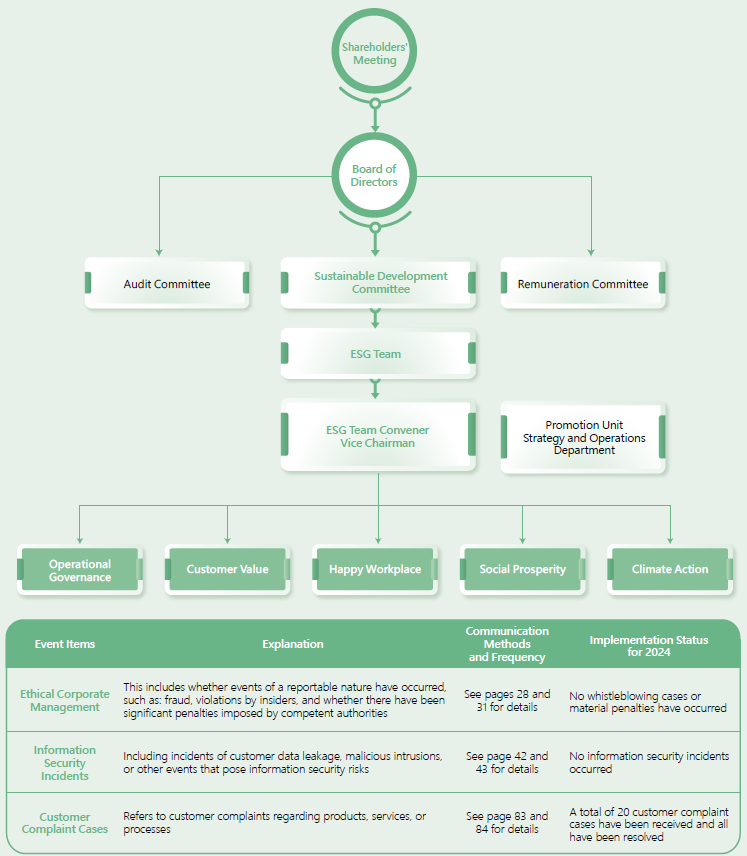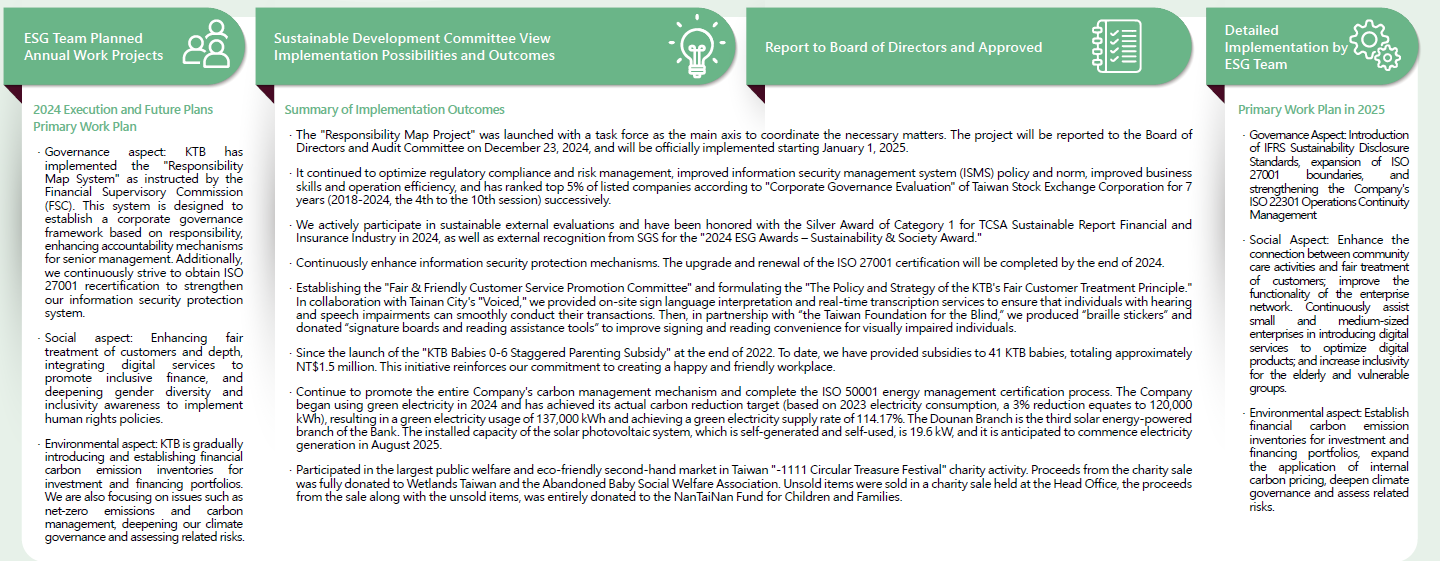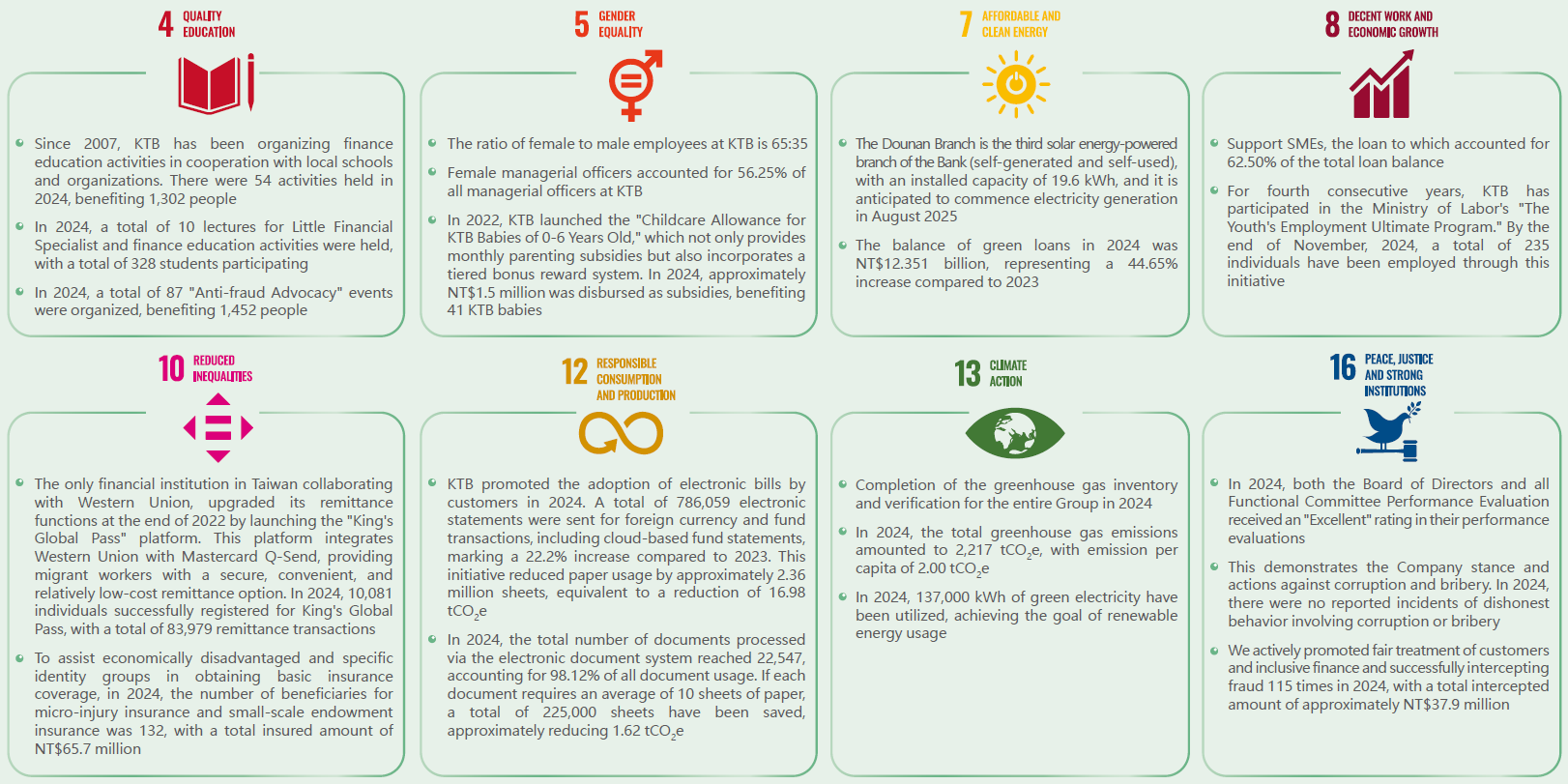Sustainable Enterprise Blueprint
Sustainable Enterprise Blueprint Strategy and Management
Corporate sustainable development is our goal of moving forward continuously. Apart from insisting on prudent management in the finance industry, we have also been contemplating on: how to fulfill the social responsibility of an enterprise? How to deliver resources to the people in need? How to exert our influence on the positive development of the whole society?
For this purpose, KTB formulated "Sustainable Development Best Practice Principles" passed by the Board of Directors in reference to "Sustainable Development Best Practice Principles for TWSE/TPEx Listed Companies" of Taiwan Stock Exchange Corporation, "UN Global Compact." The content covers areas such as implementing corporate governance, promoting sustainable environment, maintaining social welfare, and strengthening the disclosure of information on corporate sustainable development. The "Sustainable Development Committee" affiliated to the Board of Directors is also set as the supreme guidance unit of sustainable development, under which "ESG Task Force" (Also known as Sustainability Team) served as ESG promotion unit, and then established KTB's list of materiality principles in "governance," "society" and "environment" by virtue of organized operation and strategic planning, evaluated risks and opportunities of various topics under discussion, and studied and drew up corresponding management strategies and action plans, to reduce the impact and influence.
Sustainable Development Management Framework
In sustainable development management framework, the "Sustainable Development Committee" is the supreme guidance unit of sustainable development. Such committee consists of at least three directors elected by the Board of Directors, the majority of which are independent directors. In addition, there is also an "ESG Task Force," which would hold meetings quarterly. The Vice Chairman is the convener of ESG Team, and the Strategy and Operations Department is the promotion unit, which is responsible for formulating and reviewing ESG policy, system and management policies, integrating and planning ESG activities of the whole bank in collaboration with various other departments of the Headquarters. Besides, submit execution results and future work plan, etc. of sustainable development to the "Sustainable Development Committee" for discussion, and then report to the Board of Directors, and make adjustment as advised by the Board of Directors.
In 2024, the Company held total 4 "ESG Task Force Meetings," and submitted the execution plan and results to the "Sustainable Development Committee" for discussion on February 26, 2024 and August 12, 2024, and then reported to the Board of Directors, to review important ESG strategies, topics and key events of the Company, and make resolution on subsequent management policies. Contents of proposal are as follows: revision to Sustainable Development Best Practice Principles, Material Issue Analysis, Communication with the Stakeholders, Execution Condition of Sustainable Development in 2023, Sustainable Development Plan in 2024, Execution Condition of Sustainable Development in the First Half of 2024, Financial Disclosure Report of Climate Risks, and Greenhouse Gas Inventory and Verification Plan. The above contents are consented and passed by all members of the Sustainable Development Committee and all participating directors of the Board of Directors. "Sustainable operation" is combined with daily business to promote development of various ESG aspects, and improve efficiency of the enterprise in executing sustainable development.
Additionally, the Company has established an internal reporting and monitoring mechanism, designating significant events that may impact operational stability or reputation as key areas of focus for sustainable governance. Through the Board of Directors and various functional committees, key risk events are regularly monitored to ensure that these events can be effectively managed and improvements are implemented. The Company’s communication methods for key events and an overview of the implementation status in 2024 are shown in the table as below:


Results of Internal Audit on Sustainable Development
The Company has established the "Implementation Rules of Internal Audit and Internal Control System" which is to be implemented after approval by the Board of Directors. This Rule is used to supervise the business implementation status of various departments. The implementation status of sustainable development is also audited annually through internal control and internal audit mechanism. The audit content includes customer satisfaction surveys, consumer protection education promotion, report on the contents of the implementation and planning of sustainable development presented to the Board of Directors, the preparation of sustainability reports, updates of sustainable development information on the official website, and the completion of stewardship reports. The audit result for 2024 is classified as low risk.
In addition, regulations related to sustainability and regulatory compliance, such as the "Corporate Governance Best-Practice Principles" and the "Implementation Rules of Regulatory Compliance," have all been approved by the Board of Directors. Relevant progress is tracked during ESG task force meetings, covering items such as board meeting attendance, proportion of shares pledged, amendments to regulations in cooperation with competent authorities, and the implementation status of fair treatment of customers. The audit result for 2024 is classified as low risk.
The Company has established a "Risk Management Policies" and "Climate Risk Management Guidelines," as well as environmental and net-zero targets, all of which have been approved by the Board of Directors. These policies are reported on during meetings of the Risk Management Committee and the ESG task force, detailing the implementation progress. For instance, based on the materiality principle, risk assessments of environmental, social, and corporate governance issues related to the Company's operations are conducted. Relevant risk management policies or strategies are formulated and climate risks and opportunities are analyzed. Furthermore, the audit results for 2024 is classified as low risk.
The aforementioned specific measures for sustainable internal audits, regulatory compliance, and risk management are reported to the Board of Directors on a quarterly or semi-annual basis, in line with the goal of strengthening the sustainable governance mechanism under the supervision of the Board of Directors.
Respond to the UN Sustainable Development Goals
The United Nations proposed global sustainable development goals (SDGs) in 2015 as the guideline for sustainable development action, the Sustainable Development Committee in Taiwan also formulated Taiwan sustainable development goals (T-SDGs) in accordance with local development demand. The UN promoted collaboration across all sectors to encourage cooperation and efforts of the international, government, agencies and organizations and every person by focusing on People, Planet, Prosperity, Peace and Partnership, with the aim of being able to eradicate extreme poverty and hunger and realize a peaceful society with dignity, justice and inclusiveness by 2030. When focusing on sustainable strategy, KTB practiced its core concept of "take from society, give back to society," and included UN sustainable development (SDGs) and Taiwan sustainable development goals (T-SDGs) into decisions on development strategy and core business, so as to actively fulfill due responsibilities as an international citizen.
KTB's sustainable development strategies has integrated SGDs and T-SDGs and the actions are as follows:
